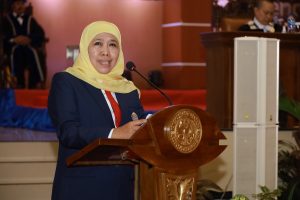UNAIR NEWS – The Free Nutritious Meal Program (MBG) has once again sparked public discussion following a proposal by the Head of the National Nutrition Agency (BGN), Dandan Hindayana, to incorporate insects into the MBG menu. This suggestion stems from the dietary habits of certain regions where insects such as grasshoppers and sago larvae serve as protein sources. Lailatul Muniroh, SKM, MKes, a nutrition expert at Faculty of Public Health, Universitas Airlangga (UNAIR), shared her perspectives on both the opportunities and challenges of implementing this idea.
Muniroh outlined several critical factors that must be considered before incorporating insects into the MBG menu. While insects offer a high protein content, major challenges arise from cultural perceptions, psychological barriers, and food safety concerns.
“Certain communities are accustomed to consuming insects, making this practice acceptable within specific groups. However, many regions do not regard insects as a viable food source,” Muniroh explained. She stressed that such policies must be designed to genuinely benefit the public rather than serving as mere symbolic initiatives with limited impact.
Nutritional value of insects
Muniroh elaborated on the nutritional advantages of insects, noting that they contain a higher concentration of protein per 100 grams compared to beef and chicken. Insects are also rich in essential amino acids and unsaturated fatty acids such as omega-3 and omega-6. “However, a significant quantity would be required to meet daily protein intake recommendations,” she cautioned.
Public acceptance remains a primary challenge, necessitating innovative approaches to make insect-based foods more palatable. One potential solution is processing insects into protein-rich flour, which can then be used in various food products.
Additionally, Muniroh underscored the importance of food safety standards and regulatory measures regarding insects as a food source. “Existing food laws lack specific guidelines on insect consumption and safety. However, some regulations, such as the Indonesian Food and Drug Authority (BPOM) Regulation No. 13 of 2016 on processed foods containing novel food ingredients, provide a framework,” she noted.

Under these regulations, insect-based products must undergo BPOM evaluation before being approved for public distribution. Muniroh also raised concerns regarding potential allergic reactions and overall food safety, given that Law No. 18 of 2012 on Food does not explicitly classify insects as a food commodity.
Public perception
Despite their nutritional value, the consumption of insects in Indonesia still faces significant resistance, primarily due to cultural and psychological factors. Most Indonesians do not view insects as a conventional food source.
“Although some regions have a tradition of consuming insects, it remains an uncommon practice for most Indonesians. The acceptance of insects as a dietary staple is influenced by cultural, psychological, social, and economic factors,” Muniroh explained.
In closing, she expressed hope that the government would implement clear regulations on insect consumption, educate the public on its benefits, and encourage innovation in developing insect-based food products. Supporting small and medium-sized enterprises (SMEs) in insect farming could also help establish a sustainable supply chain for these ingredients.
“We must ensure that the MBG program is not merely a superficial initiative but a genuine effort to improve public welfare. This program should not be reduced to simply distributing food without a meaningful impact,” Muniroh concluded.
Author: Anggun Latifatunisa
Editor: Yulia Rohmawati









